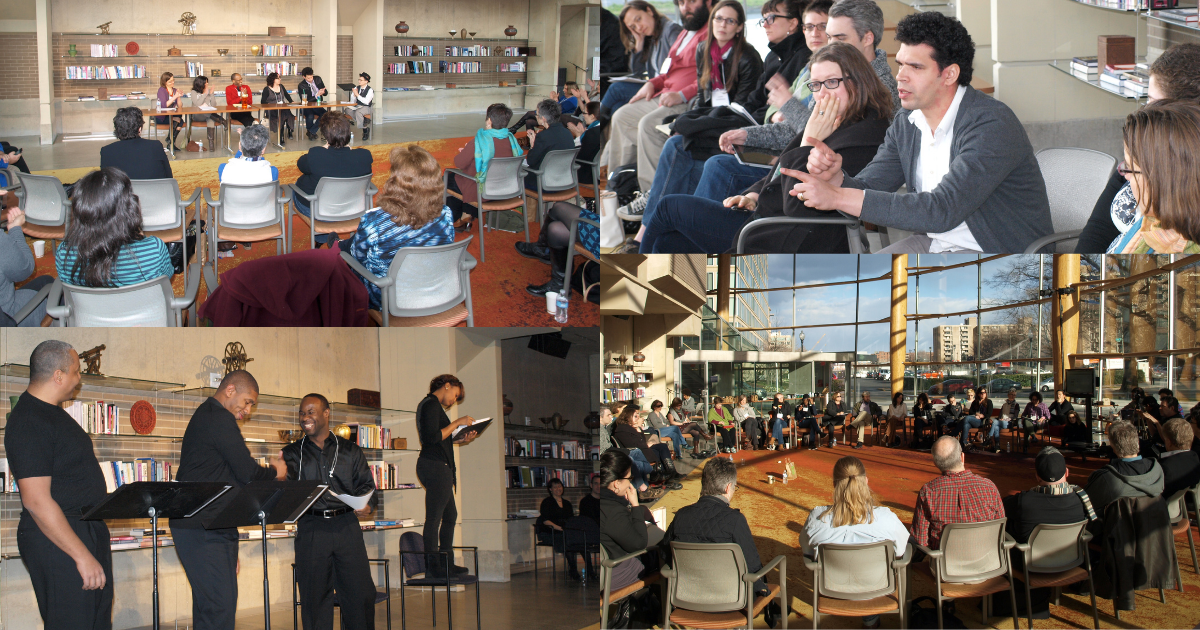21st Century Literary Office: Exploring the Literary Practice of Tomorrow
See the full video of the convening here
Washington DC, 24–25 February 2012
The convening 21st Century Literary Office: Exploring the Literary Practice of Tomorrow brought approximately forty theatremakers to Washington, DC to discuss their role as literary managers, dramaturgs, and artistic producers involved in supporting, developing, and producing new work. See the full list of participants here.
“We must be active and go out and find the plays, make the plays, dream them into being…. We must remember the love of everything that brought us to dramaturgy to begin with, and although we understand structure, I dare us not to be bound by it." — Julie Felise Dubiner
The convening opened with David Dower interviewing Jerry Patch, at the time the director of artistic development at the Manhattan Theatre Club, about his prior work reading scripts at South Coast Rep before it had a full-time staff and his experience of the emerging literary office. Jerry clarified that it is not the role of the dramaturg to add intellectual rigor to the theatre, nor is it their role to be the theatre’s “intellectual conscience,” but rather to have the conversations and “be the defense of the artist” in the community. Following this interview, several artists delivered prepared manifestos for the literary office of the future. Finally, there were inner-circle/outer-circle conversations around the following questions:
- What’s “literary” in the literary office and do we need a new name?
- Literary managers: gatekeepers or yes-men?
- What is the relationship between the literary manager, the dramaturg, and the rehearsal room?
“We feel really strongly that [the script submission policy] is a point of access for playwrights, that if we shut it down, we don’t know what else to offer them” — Madeleine Oldham
Other important questions included:
- Do literary managers think of themselves as theatre artists? What is the dramaturg’s skin in the game in creation of theatre and how does that get recognized?
- Do literary managers have a responsibility in blind submission as a social service to the field?
- While dramaturgs often encourage plays to be too tight and too neat, and to follow a model, how do literary offices support the creation of complex work and trust the audience with it?
Read the convening report by Janice Paran

“Let's keep one slot every year as TBA, fully staffed and budgeted, so we can be immediately responsive to the world.” — IIana Brownstein
21st Century Literary Office: Exploring the Literary Practice of Tomorrow outlined many of the challenges and opportunities around “the pile”—the stacks of unread and unremembered plays that seem to accumulate at literary offices across the country—and focused on ways that regional theatres could pool resources and share information about emerging playwrights. The two-day convening also featured a public-facing event called “Stuck at the Gate,” a performance of selected scenes from “heartbreak plays”— those that never made it to production, despite being championed by a literary manager or artistic producer.
Read related HowlRound content
“In the literary office of the future, the focus will shift from new play development to playwright development. Under such conditions, writers enter into relationships with institutions that are not based solely on one particular play but rather on an investment in the writer.” — Otis Ramsay-Zöe
